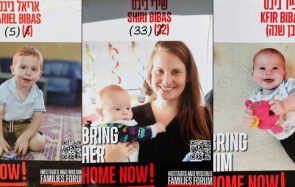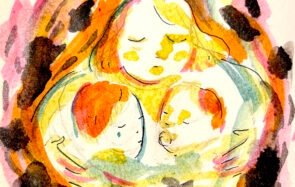At just four years of age, my son is already showing signs of an affliction. This particular condition usually begins with symptoms of wonder and enchantment during Christmastime. It progresses to profound longing for the Christmas experience and, later, as it becomes clear that one does not and likely will not celebrate Christmas, it may lead to resentment as the holiday takes on a life of its own each year.
It’s a story as old as time–or at least as old as the 4th century C.E. when the earliest Christmas celebrations were recorded–the Jewish kid wants to celebrate Christmas. Many Jews suffer from this condition and in that respect, my son can find comfort with his tribe, but I feel regret that he may have inherited this predisposition from me–and worse, that my response to his yearnings for inclusion in the “most wonderful time of the year” may have exacerbated the allure of this colorful, sparkly holiday.
Last year I was shopping with my son in a large retail store and even though it was only fall, the store already had its holiday paraphernalia out on display. “Ooooooh, Christmas lights. I want some of those for our house,” said my son with a twinkle in his eye. I immediately shut it down. “I’m sorry honey but we don’t celebrate Christmas so we won’t have Christmas lights in our house.” “Why not?” he demanded. “Because we’re Jewish and Jewish people don’t celebrate Christmas.”
This was the same maxim I had been told as a child by my parents when I asked why we couldn’t have a Christmas tree like my best friend across the street. For me, it was all about the tree. I loved the smell; I still do. The Christmas tree represents so many things to me: covetous feelings of nostalgia for an experience I never had, guilt over relishing the tree’s aromatic smell, and bitter loathing when the Christmas tree lots reappear each year.
Up to this point I had been lucky enough to avoid this discussion with my son. Since he was so young, I was able to prevent nearly all contact with Christmas by not taking him to certain festive places. But last year was different. Now in a secular preschool, his peers were sharing their holiday traditions and plans. He was no longer impervious to the Christmas experience. Besides, even if I did insulate him in a protective Jewish bubble, it would be futile, as Christmas seems to seep in by osmosis, as best I can tell.
“I’m not Jewish,” he announced loudly as we rolled through the store. I looked around, mortified, and tried to ignore this statement, but he said it again, even louder. “I’m not Jewish, Mommy. I’m Christmas.” I was relieved to hear the malapropism and couldn’t help but chuckle. He went on, “Oh, and Halloween. I’m Christmas and Halloween.”
After his bold religious denouncement, the Christmas issue tormented me. While I felt confident that some day my little Jewish boy would grow to become a proud Jewish man, I felt sorry that he was already feeling the envy associated with being different and the desperation to be a part of the crowd.
I consulted a local rabbi and attended a workshop about how to deal with the challenge of raising Jewish children around Christmas time. How would I explain to my son that his beloved cousins, my brother’s children, have a Christmas tree? Could attending their Christmas celebration, however diluted and blended with Hanukkah, make him less Jewish? How should I respond to questions about Santa Claus? That was particularly vexing, as I have no reason to tell him about Santa and couldn’t fathom perpetuating the Santa story in my house, but I would hate for my guileless son to spoil some other child’s fantasy.
The rabbi suggested that I focus on growing my own tree, metaphorically speaking, instead of trying to cut down every Christmas tree I encountered. Make no mistake; she was definitely not suggesting we get a Hanukkah bush. Rather, she meant that I should strive to make our Jewish life as vibrant as possible so that my children will be buoyed against threats to their faith.
It was also recommended that I try to make Hanukkah as awesome as possible in our house. Even though it is a relatively minor Jewish holiday, it celebrates an important military victory, which ultimately advanced the righteous cause of religious freedom. Yet, as righteous as this may be, Hanukkah still cannot compete with Christmas.
For religious Christians, Christmas is a holiday that celebrates the birth of their god. That’s undeniably, hugely important. And for everyone else, Christmas is a jovial time where a jolly fat man doles out presents to children who have been looking forward to this day all year. Everyone gets the day off from work or school and enjoys a delicious ham dinner with loved ones. What’s not to like about all that?
Sure latkes, dreidels, and sufganiyot (jelly doughnuts) help to increase the fun factor for Hanukkah, but the task of getting a young child excited about being Jewish cannot start and end with Hanukkah. Being Jewish is about so much more than just eight nights out of the year and that is where the real work of growing my own tree, or little Jewish sapling, will have to begin.
As the holidays approach this year I have loosened my stance a little bit. I realize the more secure I feel in my own Jewish identity, the more my children will follow. I want to feel okay attending another person’s Christmas celebration without feeling threatened by the larger implications it has to my family. I am going to enjoy the redolent, Proustian Christmas tree smell without guilt. I won’t ever have one in my own home but I will look forward to smelling everyone else’s.
My son thinks Christmas lights are beautiful. He’s right. And sometimes, when we drive around at night during this season, we look for the first signs of twinkling holiday lights. Hanukkah is the festival of lights, after all.
Like this post? Get the best of Kveller delivered straight to your inbox.







